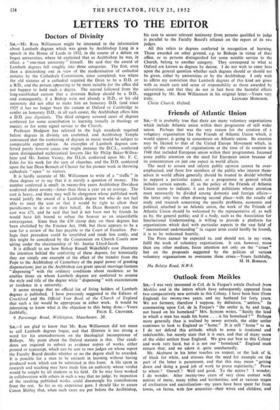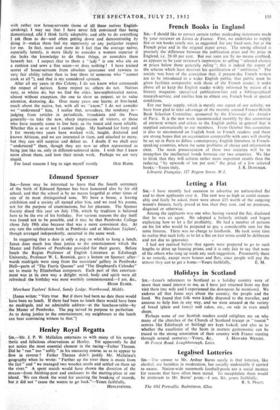• Outlook from Meikles
was very interested in Col. de la Fargue's article Outlook from Meikles and in the letters which have subsequently .appeared from two comparatively new arrivals in this Colony. I have been here (from England) for twenty-two years, and my husband for forty years. We are farmers; therefore I suppose, by definition, ," settlers." In commenting upon CoL de la Fargue's " the settler is, by and large, not based on his homeland" Mrs. Symons writes, " Surely the land in which a man has made his home . . . is his homeland ? " Perhaps more generally than is realised by newer arrivals, the older settler continues to look to England as " home." It is still " home " to us. I do not defend this attitude, which to some is irrational and indefensible, but merely state that it is ours, and that of many more of the older settlers from England. We give our best to this Colony and work very hard, but it is not our " homeland." England must remain that; and we adore it, quite unashamedly.
Mr. Akehurst in his letter touches on respect, or the lack of it, of black for white, and stresses that the need for example on the part of the latter is paramount, and that this may mean " getting down and doing a good job of work to prove superiority." Prove to whom ? Oneself ? Well and good. To the native ? I wonder; I do wonder. After twenty-two years of very close contact with natives of many, many tribes and territorities, and at various stages of civilisation and uncivilisation—my years have been spent far from towns, on farms, with few amenities—their wives and children, and
with rather raw house; servants(none of all these natives English- speaking), I may say that I have never felt convinced that being domesticated, add I think fairly adaptable, and able to do everything I ask then' to do—and often getting down' and demonstrating by doing it—makes them feel my superiority or any particular respect for me. In fact, more and more do I feel that the average native, especially latterly, is more likely to consider a woman superior if she lacks the knowledge to do these things, or considers them beneath her. I suspect that to them a " lady " is one who sits on a cushion and sews a fine seam—or does nothing ! I have trained scores of house-servants from absolute ignorance and rawness to very fair ability (often• then to lose them to' someone who " cannot cook at all"), and that is my considered opinion.
After all my years in this Coldny, I do not know what commands the respect of natives. Some respect us; others do not. Natives vary, as whites do, but we find the older, less-sophisticated native, almost without exception, the one to show us respect, or- to value attention, doctoring, &c. Over many years one learns, at first-hand, much about the native, but, with all we " know," I do not consider we " understand " him. I realise that, nowadays, the tendency is— judging from articles' in periodicals, broadcasts and the Press generally—to take the new, sharp impressions of visitors, or those who have recently come to live here, as the truest and most reliable. Whether this is so or not I cannot judge. My husband for forty and I for twenty-two years have worked with, taught, doctored and known Africans, and we are interested in them, and attached to many, but they can still surprise and defeat us. I doubt if we shall ever " understand" them, though they are now so often represented as being just like us, only in different-coloured skins. I wish that I knew more about them, and how their minds work. Perhaps we are very stupid. 1 For local reasons I beg to sign myself merely OLD HAND.



































 Previous page
Previous page